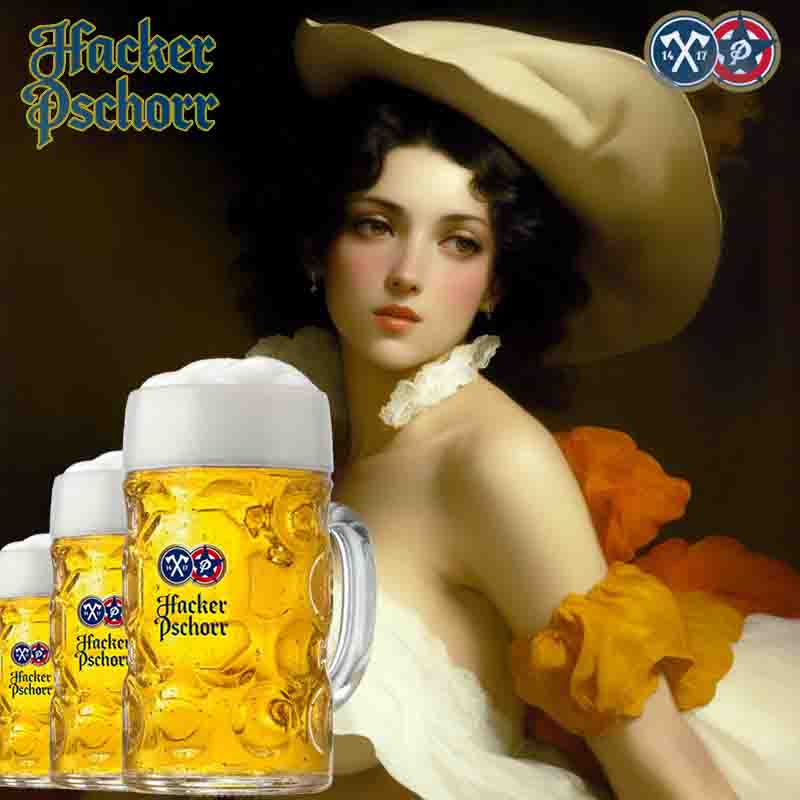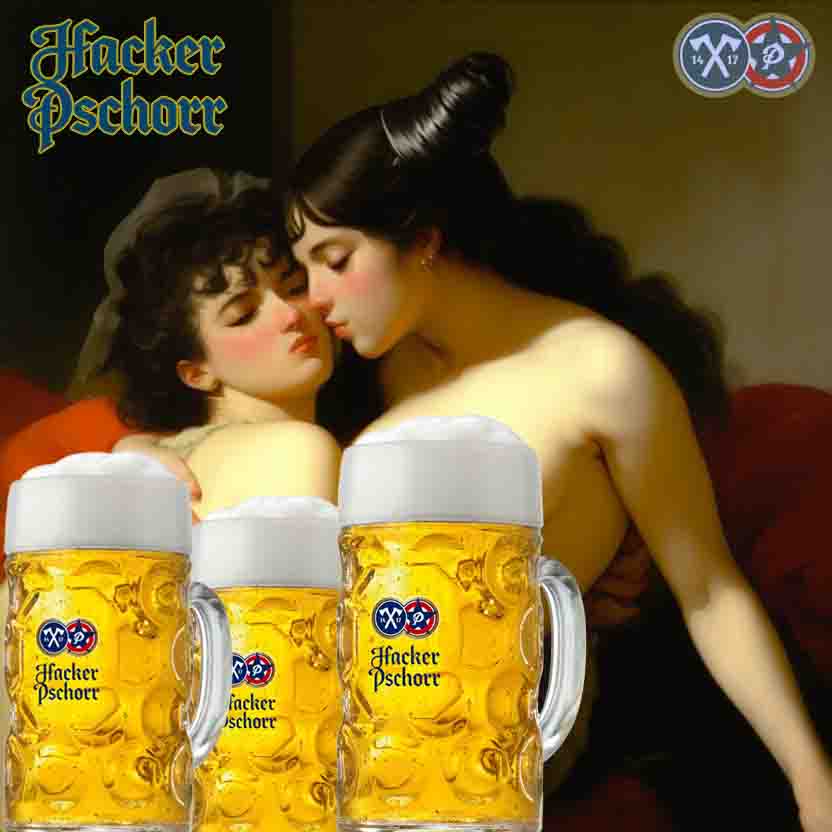Beer brewing heritage of Hacker-Pschorr
The Hacker-Pschorr beer brewery is located right in the dynamic heart of Munich, a city known worldwide for its centuries-old beer culture and historic breweries. This prestigious institution is not just a brewery, but a living testimony to the art, history and cultural significance of beer in the region.

As one of Munich's esteemed breweries, Hacker-Pschorr stands as a torchbearer of tradition, paying homage to Bavaria's time-honored brewing heritage.
Hacker-Pschorr is a renowned brewery based in Munich, Germany, with a history dating back to 1417. The name reflects the merger of two traditional Munich breweries, Hackerbräu and Pschorrbräu, in the 1970s.
Hacker-Pschorr's Position in the Munich Beer Landscape
Hacker-Pschorr's contributions to the Munich beer landscape are manifold, encompassing not only the exceptional beers it produces but also the ambiance it offers. Hacker-Pschorr predates even the iconic beer festival Oktoberfest, that Munich is globally acclaimed for.
Altes Hackerhaus:
-
Sendlinger Str. 14 - 80331 München
-
Restaurant opening hours: Monday to Sunday from 11am to 11pm
-
Reservation: +49 260 50 26 - hackerhaus.de
Hacker-Pschorr Timeline
The Hacker-Pschorr is a brewery in Munich, Germany. It was founded in 1447 by the Hacker family and in 1607 by the Pschorr family. The two breweries merged in 1972 and are now part of the Paulaner Brewery Group. Hacker-Pschorr is known for its Helles beer, which is a pale lager.
-
1447: The Hacker family founds a brewery in Munich.
-
1607: The Pschorr family founds a brewery in Munich.
-
1797: Joseph Pschorr, son-in-law of Peter Paul Hacker, marries Theresia Hacker and acquires the Hacker brewery.
-
1813: The Hacker-Keller is built, the largest storage cellar in Germany at the time.
-
1876: Hacker-Pschorr's Helles beer is awarded a gold medal at the World's Fair in Philadelphia.
-
1972: The Hacker and Pschorr breweries merge to form Hacker-Pschorr.
-
1985: Hacker-Pschorr opens a new brewery in Munich.
-
2002: Hacker-Pschorr is acquired by the Paulaner Brewery Group.
-
2017: Hacker-Pschorr celebrates its 570th anniversary.
-
2023: Hacker-Pschorr continues to brew high-quality beers and is a major player in the German beer industry.
Hacker-Pschorr produces a variety of beers, including Märzen, Dunkel, and Weissbier. The legendary brewery has a large beer garden in Munich, which is a popular destination for tourists and locals alike.
Hacker-Pschorr's Authentic German Beer

With roots tracing back to 1417, Hacker-Pschorr has cultivated a legacy that's deeply interwoven with Munich's cultural fabric.
Hacker-Pschorr's Legacy: Tracing the Origins of Hacker-Pschorr
In the heart of Munich, a historical gem known as "Preustatt an der Hagkagasse" was already making its mark as early as 1417.
Today, this legacy lives on through the renowned Hacker Pschorr tradition, where their exquisite beers grace the glasses of not just Munich's locals, but also find favor among international connoisseurs.
The Iconic Duo: Maria Theresia Hacker and Joseph Pschorr
Central to this legacy are the figures of Maria Theresia Hacker and Joseph Pschorr, whose union gave birth to the iconic name Hacker-Pschorr.
Guided by their visionary leadership, Hacker-Pschorr rose to become the pinnacle of Munich's brewing scene during the 18th century, a stature it maintains to this day.
Sustainable Traditions and Audacious Innovation
What defines Hacker-Pschorr, apart from its rich history, is the amalgamation of sustainable practices with audacious innovation, an ethos that has earned it the reputation of being the "heaven of the Bavarians" since its inception.
Hacker-Pschorr beer culture insights
Anchored in its iconic Hacker Crest, the brewery proclaims 1417 as its birth year. Yet, within this context, it's pertinent to clarify that the accuracy of this date is shrouded in ambiguity, potentially stemming from a mistranslation.
The true founding year remains elusive, with suggestions placing its beginnings either as early as 1363 at Sendlinger Straße 75 or possibly as late as 1480 at number 75c.
In the latter scenario, brewing activities could be confirmed until 1431, while the former hypothesis envisions the building's initial role as a tavern, with brewing operations commencing only in 1691.
The modern chapter of Hacker-Pschorr's narrative unfurled in 1738, as Simon Hacker, an innkeeper, assumed control of the Probst'sche Brauerei at Sendlinger Straße 75, appending his name to the legacy.
Yet, it wasn't until the marriage of Joseph Pschorr, a skilled brewer, to his daughter that the brewery's trajectory shifted towards success.
Hacker-Pschorr beer historys
The acquisition of the brewery in 1797, just four years after the nuptials, marked a turning point.
Under Pschorr's guidance, production volumes burgeoned substantially, and between 1813 and 1823, the brewery emerged as the largest brewhouse in Germany.
It proudly stood on Landsberger Strasse, christened Munich's "beer fortress," serving not only as a brewery but also as a beer outlet.
Pschorr's ambitious expansion was evident in his acquisition of the insolvent Bauernhanslbräu at Neuhauser Strasse 11 in 1820, followed by the establishment of a second brewery, Pschorrbrauerei, managed by his son Georg.
A fiery milestone was reached when the original brewery building burned down in 1825, ushering in a new era.
A rebuilt structure emerged, accompanied by significant expansion through neighboring property acquisitions.
Mathias, Pschorr's younger son, joined the fold during this time, shouldering the legacy as his father retired.
The beer fortress on Landsberger Strasse was subsequently divided between the two brothers
In 1865, the Hackerbrauerei relocated from Sendlinger Strasse to a new home on Bayerstrasse, a move mirrored by Pschorrbräu's shift to the same locale by 1877.
Hacker-Pschorr: A Bavarian Beer Journey
In the present day, the old Hackerhaus still thrives as a pub on Sendlinger Straße, while the halls of Pschorbräu in Neuhausertraße yielded to the trends of the 1960s.
A pivotal moment came in 1972, as the Munich beer landscape witnessed the merger of Hacker and Pschorr legacies, forming Hacker-Pschorr AG.
This union, boasting an impressive beer output of 900,000 hl, secured the third position among Munich's brewers, trailing only Löwenbräu and Paulaner.
However, as time flowed on, the corporate structure transformed, transitioning to a limited liability company (GmbH) fully owned by Paulaner by 1985.
The former brewery site on Bayerstrasse metamorphosed into Pschorrhöfe, now the abode of the European Patent Office.
Amidst this evolution, the Hacker-Pschorr beers found a new haven in Langwied since Paulaner's relocation in 2016.
The narrative of Hacker-Pschorr stands as a testament to time, weaving together the threads of tradition, innovation, and resilience that continue to flavor each and every glass poured in honor of its legacy.
Brewmaster's Craftsmanship at Hacker-Pschorr
Behind every exceptional brew lies the artistry and dedication of a brewmaster—an individual who marries science with passion, turning raw ingredients into liquid gold.
Rooted in centuries-old tradition, Hacker-Pschorr presents an exquisite selection of beers that reflect the depth and breadth of German beer styles.
From the well-loved classics to regional specialties, every bottle encapsulates the essence of Bavaria's beer legacy.
Hacker-Pschorr's Beer Portfolio
At the heart of Munich's beer culture lies a spectrum of flavors, each brewed with meticulous care and steeped in tradition. Within this colorful array, Hacker-Pschorr's beer portfolio stands as a testament to the brewery's unwavering commitment to excellence and the celebration of Bavarian heritage.
-
Münchner Hell (5.5% ABV): This is the flagship beer of Hacker-Pschorr. It is a pale lager with a golden color and a slightly sweet taste.
-
Münchener Gold (5.8% ABV): This is a stronger version of Münchner Hell. It has a more pronounced malty flavor.
-
Hell Alkoholfrei (0.5% ABV): This is a non-alcoholic version of Münchner Hell. It has a light, refreshing taste.
-
Münchner Dunkel (5.5% ABV): This is a dark lager with a malty flavor and a hint of chocolate.
-
Münchner Radler (2.5% ABV): This is a blend of Münchner Hell and lemonade. It is a refreshing drink for hot weather.
-
Natur Radler (2.5% ABV): This is a similar blend to Münchner Radler, but it is made with natural ingredients.
-
Oktoberfest Märzen (6.3% ABV): This is a strong lager that is brewed especially for the Oktoberfest festival. It has a malty flavor and a slightly sweet taste.
-
Animator: Naturtrüber Doppelbock (7.5% ABV): This is a strong, dark lager with a full-bodied flavor. It is brewed with a special yeast that gives it a cloudy appearance.
-
Kellerbier (5.2% ABV): This is a traditional Bavarian beer that is unfiltered and unpasteurized. It has a cloudy appearance and a refreshing taste.
-
Superior (5.8% ABV): This is a premium lager that is brewed with a blend of malts and hops. It has a smooth, malty flavor and a slightly hoppy aroma.
-
Hefe Weisse (5.5% ABV): This is a wheat beer that is unfiltered and unpasteurized. It has a cloudy appearance and a fruity, refreshing taste.
-
Stern Weisse (5.5% ABV): This is a stronger version of Hefe Weisse. It has a more pronounced fruity flavor.
-
Doppelbock Dunkel (7.2% ABV): This is a dark doppelbock with a rich, malty flavor.
-
Edelhell (5.2% ABV): This is a light, crisp lager with a slightly sweet taste
-
Helles Bock (6.5% ABV): This is a strong, malty lager that is brewed in the spring.
-
Märzen Dunkel (5.7% ABV): This is a dark Märzen with a malty flavor and a hint of chocolate.
-
Weisse Alkoholfrei (0.5% ABV): This is a non-alcoholic version of Hefe Weisse.
-
Winterbock (7.5% ABV): This is a strong, malty lager that is brewed in the winter.
These are the beers that are currently brewed by Hacker-Pschorr. The brewery may also produces other beers on a limited basis for special occasions.
The Maestros Behind the Brews: Hacker-Pschorr's Brewmaster
Hacker-Pschorr's brewmaster is the guardian of tradition and the harbinger of innovation.
With years of experience and an intimate understanding of every facet of brewing, the brewmaster is the orchestrator of flavors, the guardian of quality, and the keeper of tradition.
They're the driving force that ensures each batch of Hacker-Pschorr's beer meets the highest standards.
Meticulous Attention to Detail in Brewing Techniques
Crafting exceptional beer is a symphony of precision and passion. Every step of the brewing process, from selecting the finest malt to mastering the fermentation dance, is executed with meticulous attention to detail.
The brewmaster's hands guide each stage, from mashing and lautering to hopping and conditioning, ensuring that every drop embodies the essence of Hacker-Pschorr.
Honoring the German Beer Purity Law: A Brewing Foundation
At the heart of Hacker-Pschorr's brewing process lies a commitment to the German Beer Purity Law—Reinheitsgebot.
This 16th-century regulation stipulates that only water, malt, hops, and yeast should be used in brewing. This dedication to simplicity ensures that every beer reflects the essence of its ingredients without compromise.
Hacker-Pschorr's Biergarten
Beer gardens are more than mere venues to enjoy a drink; they're a way of life in Munich. Rooted in history, these open-air spaces offer respite from the bustle of the city, inviting patrons to savor the outdoors, connect with friends, and revel in the beauty of communal experiences.
Hacker-Pschorr's Biergarten is a quintessential Munich experience, where locals and visitors alike converge under the canopy of chestnut trees.
The space exudes an atmosphere of warmth and welcome, where strangers become friends, and the clinking of glasses accompanies tales of everyday life.
The Biergarten's appeal lies in its marriage of nature and culture. Surrounded by lush greenery, patrons enjoy the dual pleasure of sipping on exceptional beers while relishing the embrace of the outdoors.
The simplicity of wooden tables, benches, and the natural surroundings creates an ambiance that's both rustic and refined.
A Journey through the Year with Hacker-Pschorr
Hacker-Pschorr's special seasonal brews are more than beverages; they're a narrative of the seasons, a connection to nature, and a nod to Bavaria's rich brewing heritage.
With each limited release, enthusiasts embark on a journey through time, savoring the flavors that resonate with the world's cyclical rhythm.
Spring: A Time of Renewal and Refreshment:
As winter gives way to spring, the anticipation of new beginnings fills the air. Hacker-Pschorr's spring brews mirror this spirit of rejuvenation, offering crispness and brightness that reflect the season's budding life.
These beers often feature lighter profiles, delicate hops, and a refreshing character that pairs perfectly with the awakening world.
Summer: Embracing the Sun's Warm Embrace
Summer's arrival ushers in a symphony of flavors that evoke sun-soaked days and outdoor escapades.
Hacker-Pschorr's summer brews are a celebration of the season's vibrancy, featuring citrusy notes, invigorating hops, and a thirst-quenching quality that complements the heat of the sun.
Autumn: Harvesting Richness and Depth
As leaves turn to gold and the air grows crisper, Hacker-Pschorr's autumnal brews capture the essence of harvest time.
These beers often lean towards malt-forward profiles, with hints of caramel, nuts, and spices that evoke the comforting embrace of fall's bounty.
Winter: A Warmth to Defy the Chill
As winter blankets the world in snow, Hacker-Pschorr's winter brews provide a source of warmth and solace.
These beers are often robust and full-bodied, boasting flavors of dark fruits, chocolate, and roasted malts that mirror the season's coziness.
Educating and Inspiring
As a custodian of Munich's beer culture, Hacker-Pschorr takes on the role of an educator.
Through brewery tours, workshops, and events, it opens its doors to enthusiasts, sharing insights into the brewing process, the history of beer, and the cultural significance that accompanies every pour.
In doing so, it inspires a new generation of beer lovers to appreciate the artistry and heritage of brewing.
Fostering Community and Connection
Beer culture thrives on community, and Hacker-Pschorr serves as a gathering point for individuals to connect, converse, and celebrate.
From its bustling Biergarten to its participation in Oktoberfest, the brewery creates spaces where people come together to share stories, create memories, and honor the age-old tradition of communal celebration.
A Global Ambassador of Munich's Beer Culture
Hacker-Pschorr's beers traverse continents, becoming emissaries of Munich's beer culture.
Each bottle carries with it not just a taste of Bavaria, but also the cultural ethos and the deep-rooted passion that defines Munich's identity.
As global beer enthusiasts relish Hacker-Pschorr's brews, they unknowingly become part of a continuum that spans centuries.
In an era marked by change, Hacker-Pschorr stands as a guardian of continuity—a testament to the enduring significance of beer culture in shaping human connections and narratives.
Its role extends beyond the brewery walls; it's a beacon that illuminates the way forward while preserving the footprints of the past.
Hacker-Pschorr is more than a brewery; it's a living testament to the power of tradition, community, and the profound impact of beer culture on the world stage.
Hacker-Pschorr Beer: FAQ
Are you curious about music, art, technology, fashion, humanity, lifestyle, and beer?
If so, then you need to subscribe to the free Likewolf newsletter.
100% privacy. When you sign up, we'll keep you posted.
Beer, Brews, and Beyond
Take this comprehensive guide on a trip through the fascinating world of beer.
